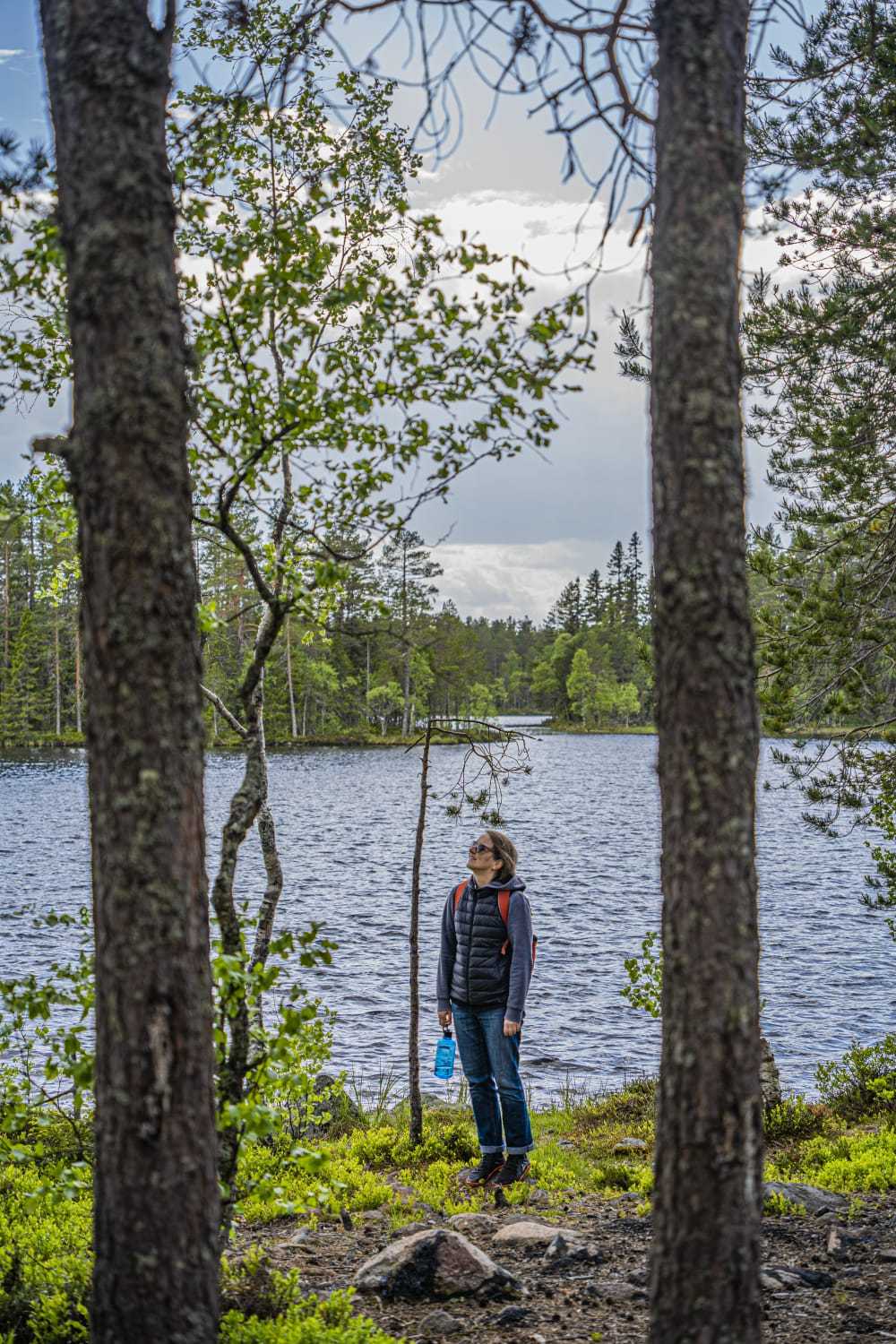
7 Books About The Climate Crisis You Should Read This Year
The year is 2019 and it feels like we’re finally talking about the climate crisis (or climate chaos as George Monbiot suggested we should start calling climate change). On Friday, March 15, over 1,4 million (in 125 countries on all continents) were on school strike for climate. This unprecedented global movement was started by Greta Thunberg, the 16-year-old Swede who skipped school last year and went on strike in front of the Swedish Parliament demanding climate action from politicians and grown-ups, in general.
The climate crisis in the most pressing issue facing our species and it’s happening now. This crisis is going to impact future generations in ways we’re just beginning to understand, hence the children paying attention in science class and taking action accordingly. For those who want to take our planetary emergency seriously and join them on their strike, we have a selection of must-read books about the climate crisis, that explain the problems while offering solutions.
A quick browse through the environmental shelves (maybe the current affairs or the science/popular science ones) of the nearest well-stocked bookshop will bring you face to face with more titles containing climate, future or Earth, than the same time last year. Some might blame this sudden interest on the 2018 IPCC special report on the impacts of global warming of 1.5 °C above pre-industrial levels, or maybe the ongoing climate science denying circus in high places, or the prevailing tendency to speed towards the 2 C degrees threshold. Whatever the reason, there’s no better time to start reading about the climate. And act on it.
It wasn’t easy to pick only 7 books. We encourage you to revisit the classics while keeping an eye on the new bestselling shelves. Have a quick look:
Being the Change: Live Well and Spark a Climate Revolution | by Peter Kalmus
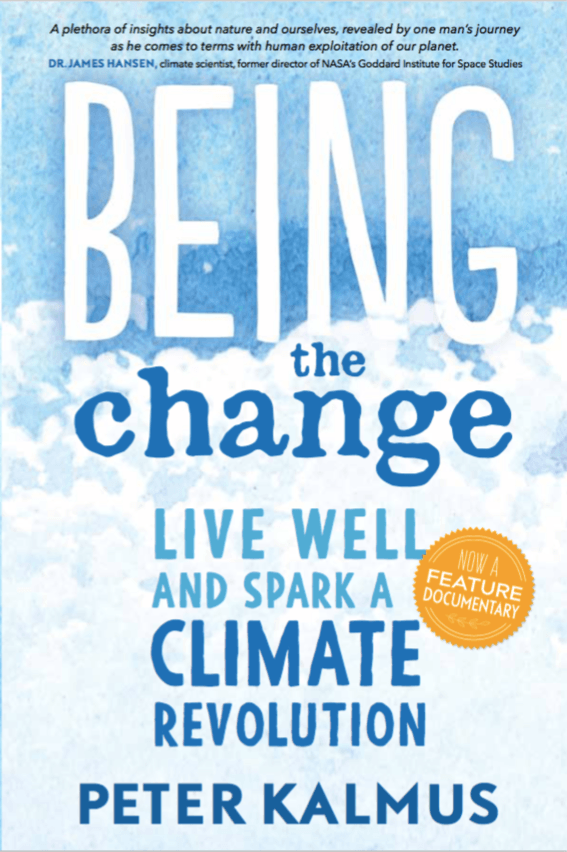
The author Peter Kalmus is an atmospheric scientist with a Ph.D. in physics, and, as everyone working in these fields, is alarmed by the drastic changes in the Earth’s systems. These discoveries made him embark on a journey to change his life and the world his two sons will inherit. He began by making what we call “small changes”, like bicycling, and growing food, but also meditating, and other fulfilling changes. Ultimately, he slashed his climate impact to under a tenth of the US average and became happier in the process. The overall message of the book (and his journey) is optimistic, and yes, a world without fossil fuels is possible, and according to Peter Kalmus, even better. But do read it and see for yourself how you can actually find joy while changing a deeply troubled world.
“Being the Change explores the connections between our individual daily actions and our collective predicament. It merges science, spirituality, and practical action to develop a satisfying and appropriate response to global warming.” — Peter Kalmus
Watch this: The trailer to “Being the Change” documentary.
No Is Not Enough: Defeating the New Shock Politics | by Naomi Klein
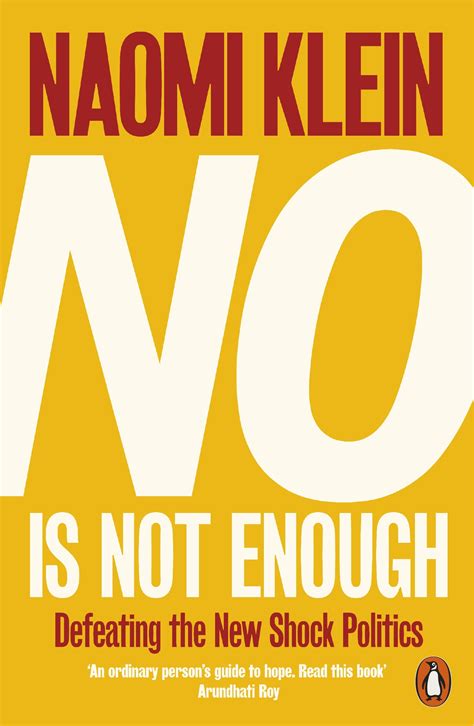
If you’re interested in the climate crisis, chances are you’ve already heard about Naomi Klein – the award-winning journalist, and bestselling author of No Logo, The Shock Doctrine and This Changes Everything. With this new book published in 2017, she gives readers the toolkit to survive our surreal present.
It goes deeper into politics than any of the other books in this list, but then again, the climate crisis is deeply rooted in political inaction. The high praise her books receive from all those notable activists, fellow writers and journalists, comes in attach with her constant search for solutions in a world caught up in some global madness.
“Who better than Naomi to make sense of this madness, and help us find a way out? A top-of-the-stack must read.”— Michael Stipe
“An ordinary person’s guide to hope.”— Arundhati Roy
The Water Will Come: Rising Seas, Sinking Cities, and the Remaking of the Civilized World | by Jeff Goodell
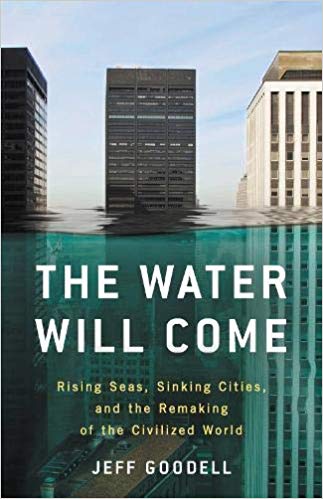
The melting of ice sheets and glaciers contributes to the sea level rise, that’s why most of the popular narratives about the climate crisis hover over these troubled waters. Acclaimed journalist Jeff Goodell employs fact, science, and first-person, on-the-ground journalism (travels across twelve countries and reports from the front lines!) to show vivid scenes from what already is becoming a water world. This book promises to be “the definitive account of the coming water, why and how this will happen, and what it will all mean.”
“By century’s end, hundreds of millions of people will be retreating from the world’s shores as our coasts become inundated and our landscapes transformed. From island nations to the world’s major cities, coastal regions will disappear. Engineering projects to hold back the water are bold and may buy some time. Yet, despite international efforts and tireless research, there is no permanent solution – no barriers to erect or walls to build – that will protect us in the end from the drowning of the world as we know it.”
— Jeff Goodell
“Elected officials may be busy arguing about whether global warming is real. But most scientists are having other arguments entirely — about whether danger is imminent or a few decades off; about whether our prospects are dire or merely grim.”— Jennifer Senior, New York Times
Books worth revisiting
These are not new books, but the authors are at the forefront of climate activism these days as they have been for decades. Bill McKibben and Mayer Hillman were talking about the climate crisis when very few would dare to open a conversation about it, let alone write books about it.
How We Can Save The Planet | by Mayer Hillman
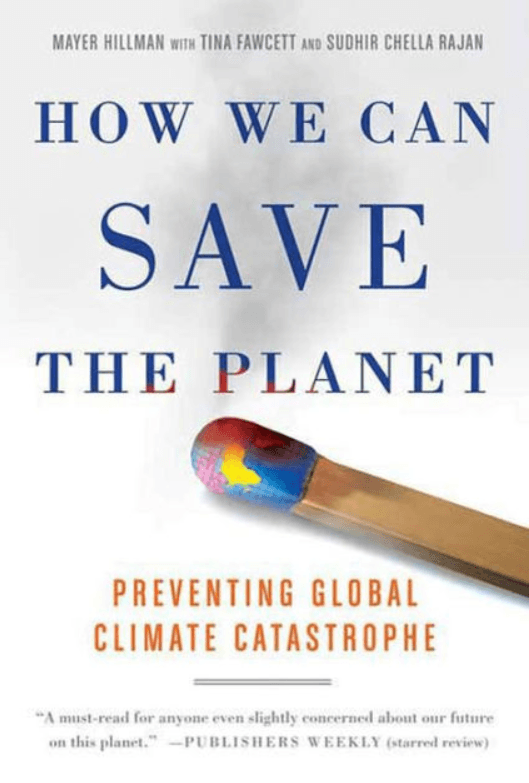
This is not a new title. You can tell by the innocent use of “save the planet”, but considering the slogans and general mood of those days, the title only underlines the detachment of society from the climate crisis regarded as an issue to do with the planet, not its inhabitants. Doctor Mayer Hillman, one of Britain’s most influential thinkers, wrote this book together with Tina Fawcett (in 2004) and Sudhir Chella Rajan (reissued in 2008). Hillman, 87 now, has made waves lately in some newspapers that interviewed him, like the one in The Guardian, where he was as straightforward as one can get: ‘We’re doomed’. It’s worth reading the interview, no matter how alarmist the title sounds, because Hillman thinks that accepting the impending end of most life on Earth might be the very thing needed to help us prolong it.
His still relevant book offers an analysis of the looming environmental catastrophe and a blueprint for avoiding it. Hillman anticipates the counter-arguments and gives the reader the ammunition to challenge the prevailing inaction in these areas. Given the current situation, I imagine Hillman would have changed that title from save the planet to something else, like save the human race. But I bet he’s no longer bothered by such nuances. And neither should you
The End of Nature | Bill McKibben
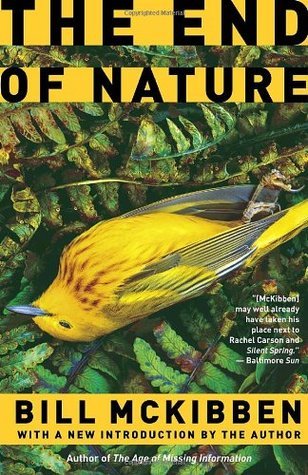
This is a classic work on the environmental crisis, one of the first books on global warming for the general public, where McKibben argues that our view of nature, its role in our lives and consciousness, has irretrievably altered.
You’ll find it as relevant now as it was when it was first published in 1989. Again, this is neither a handbook for survival or “a doomsday catalogue of scientific prediction”, this book is a plea for radical and life-renewing change, encouraging us to rethink our relationship with nature if we are to survive this crisis.
In 2008, almost 20 years after this book was published, McKibben co-founded 350.org – an organisation at the heart of climate activism, aiming to build the global grassroots climate movement that can hold our leaders accountable to science and justice. The new edition of this classic reviews both the progress and ground lost in the fight to save the Earth.
Good to know: 350 was named after 350 parts per million — the safe concentration of carbon dioxide in the atmosphere.
2019 Bestseller
The Uninhabitable Earth | by David Wallace-Wells
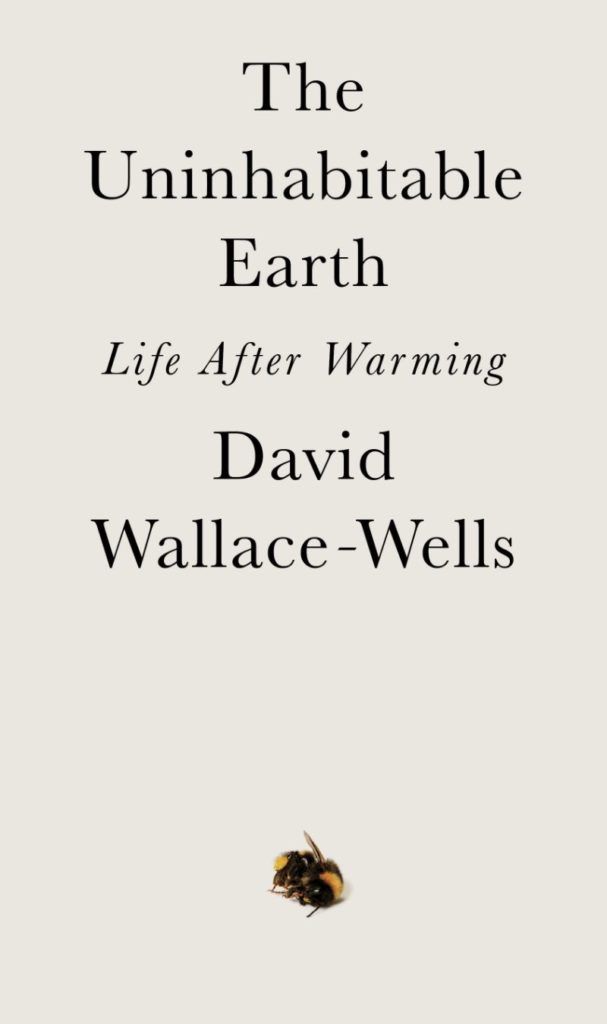
This is the most talked-about hard copy of 2019 — well, among people who talk about climate (not weather!) on a daily basis. After publishing his book, David Wallace-Wells has been interviewed by Rolling Stones, New York Times, The Guardian and a bunch of other daily, monthly, online and print publications. Everyone wants to talk to the alarmist-optimist.
In 2017, Wallace wrote an article (The Uninhabitable Earth) in New York Magazine notoriously and extensively discussed by campaigners, scientists, environmentalists. It was labelled alarmist and unhelpful, but that did not stop Wallace from digging deeper and turning it into a book. Apparently, the IPCC report made him feel he was onto something major. He was right. The report validated his initial article.
I’m not sure they’ll add it to any public library collections any time soon, but it’s worth trying to get copies in there too.
“The Uninhabitable Earth hits you like a comet, with an overflow of insanely lyrical prose about our pending Armageddon.”—Andrew Solomon
Keep an eye on this book launch
The Snap Forward: New thinking for winning the climate fight | by Alex Steffen
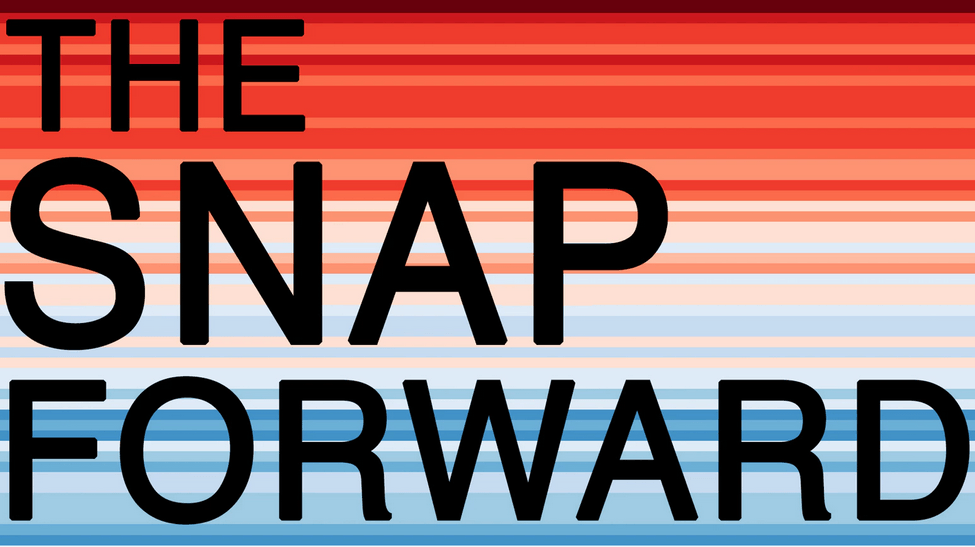
Alex Steffen is regarded as an insightful professional futurist, someone able to envision “the underlying structures of change” (James Goodman, Forum for the Future). His work explores the future of humanity and the fate of the Earth, pushing the boundaries of climate foresight and disruptive sustainability. His not-yet-published book starts from the premise that climate change is inevitable, but that the level of damage it will bring is a matter of choice dictated by our actions now and in the near future. Steffen explores the connections between nature and human systems, how we can imagine the powerful solutions we need, and how we might build a sustainable civilization.
Further action: For updates on this “bold new book about the end of predatory delay and the beginning of rapid climate action” have a look here.
“You really, really should be reading Alex Steffen. Really. He’s telling the story of the future.” —Bill McKibben
We’ll come back with more books and properly review some of them. With the clock ticking, it’s not ideas and solution we’re lacking. The inaction and general apathy, especially at the top where the high-impact decisions should be taken, are another problem we have to fix. Hopefully these books are going to inspire and trigger at least individual action. Only time will tell. But yes, the clock is ticking.
Featured image by Jack Royle
Earth.fm is a completely free streaming service of 1000+ nature sounds from around the world, offering natural soundscapes and guided meditations for people who wish to listen to nature, relax, and become more connected. Launched in 2022, Earth.fm is a non-profit and a 1% for the Planet Environmental Partner.
Check out our recordings of nature ambience from sound recordists and artists spanning the globe, our thematic playlists of immersive soundscapes and our Wind Is the Original Radio podcast.
You can join the Earth.fm family by signing up for our newsletter of weekly inspiration for your precious ears, or become a member to enjoy the extra Earth.fm features and goodies and support us on our mission.
Subscription fees contribute to growing our library of authentic nature sounds, research into topics like noise pollution and the connection between nature and mental wellbeing, as well as funding grants that support emerging nature sound recordists from underprivileged communities.

